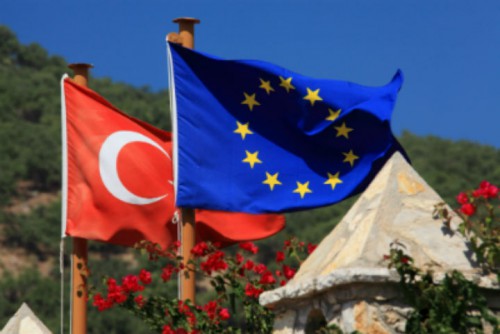2nd December 2014
Turkey, the EU and NATO
 I wrote a blog last year called “Why Turkey can be confident”. The point of that blog was to say that, given that Turkey was a large country with a trillion-dollar economy playing an influential role in world affairs, I couldn’t understand why some people argued that events inside Turkey were determined to a large extent by external actors.
I wrote a blog last year called “Why Turkey can be confident”. The point of that blog was to say that, given that Turkey was a large country with a trillion-dollar economy playing an influential role in world affairs, I couldn’t understand why some people argued that events inside Turkey were determined to a large extent by external actors.
I was reminded of the reasons why Turkey should feel confident, not spooked by mysterious dark forces, when I recently saw figures for the launch for the 2014 “Transatlantic trends” public opinion survey. The report, produced by an excellent think-tank with the confusing name of the German Marshall Fund, has been produced every year since 2002. The 2014 edition contains a mass of fascinating data – definitely worth a browse. Amongst the key findings are:
There is growing support in Turkey for EU accession. 53% are in favour, up from 45% in 2013 – the first time in 2006 that there has been a majority in favour;
A significant increase in public support for Turkey’s NATO membership – the proportion of people regarding it as “essential” was 49% compared with 39% the year before.
The percentage of respondents in Turkey who thought that Turkey should act alone (as opposed to with the EU, US or Russia) had decreased to 33% while the percentage who thought Turkey should act with the EU risen, albeit only to 28%.
I was particularly interested by chart 5 in the report, “Favourable Opinions of World Powers”. This shows that compared with people in the United States or the EU, Turkey has in general an unfavourable opinion of all world powers (the choice here being US, EU, Russia and China). But the 45% of Turks who had a favourable opinion of the EU in 2014 was nonetheless up 10 points since 2013.
It is perhaps understandable that at a time of increasing threats to peace, whether developments in Iraq or Syria or Russia’s intervention in Ukraine, that Turks are increasingly inclined to seek the security of the EU and NATO. The latest developments just over the border in Syria are likely to reinforce that trend. For example, a majority of respondents to a recent poll (52%) supported Turkish involvement in an international military coalition against ISIL.
But that growing warmth towards international engagement also reveals potential tensions in Turkey’s relationship with the EU, for example over recent tightening of internet controls or over basic rights and freedoms and the separation of powers. In its annual report on Turkey’s progress towards EU membership, the European Commission highlighted its concerns in these areas. The Turkish Government responded positively to the Commission’s report.
Many governments feel the need to tighten up on internal controls – eg the Internet, or the media – at a time when they feel stability in their country is under threat. That is, arguably, understandable. At the same time, experience shows that sometimes, paradoxical as it might seem, less controls can mean more stability.
In this context I am reminded of the wise words of Lord (Geoffrey) Howe, who as British Chancellor of the Exchequer (Finance Minister) in the 1979 presided over the decision of the British Government to abolish foreign exchange controls.
Lord Howe once told me that the decision caused him one of his few sleepless nights in British politics. The day before exchange controls were abolished, no-one could really be sure what could happen the following day.
In the event, the liberalisation of the markets of which the liberalisation of exchange controls was a part led to a boom in British financial services (the so-called “Big Bang”) which led to London becoming the world’s primary financial centre.
The UK has long been a strong supporter of Turkey’s EU membership. As such we support many projects designed to strengthen the Turkish economy and Turkish institutions, such as the recent initiative on corporate transparency. I hope that, in a sometimes threatening and dangerous-seeming environment, Turkey will continue its progress to meeting EU norms as a means to building its long-term security within the community of nations.